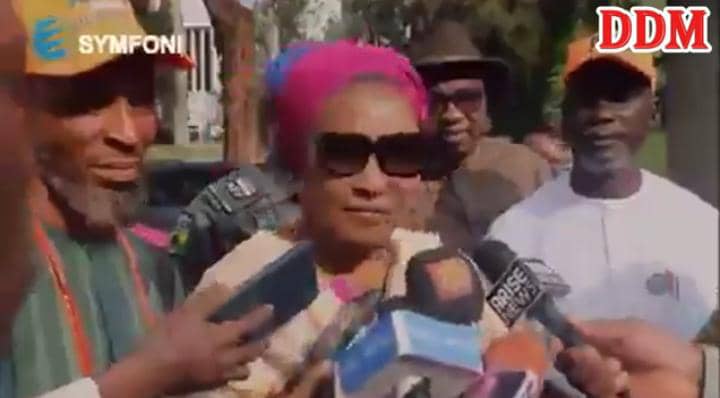Economy
Fuel loading resumes, but will Lagos’ policies push tanker drivers to the edge?
DDM News

Fuel loading activities have resumed following the resolution of the crisis between tanker drivers and the Lagos State Government.
This comes after a standoff that halted petroleum product distribution, causing widespread fuel shortages across Lagos and other parts of the country.
According to Diaspora digital media (DDM), On Wednesday and Thursday, several fuel tankers were seen on major roads transporting petroleum products to filling stations.
The resumption of fuel loading has brought relief to consumers who had faced difficulties due to the ongoing dispute.
The crisis began on Saturday when tanker drivers halted fuel loading to protest alleged harassment, assault, and extortion by Lagos task force officials.
The drivers claimed that the government unlawfully seized about 30 trucks after a task force raid at their parking area.
The parking site, located along the Lekki Free Trade Zone, is a critical hub for tankers lifting products from depots and refineries.
The Lagos State Government, however, denied these allegations and insisted that only 11 trucks were impounded for violating regulations.
Officials claimed that the enforcement team was attacked while trying to implement the e-call-up system for truck movements.
The government later released both the seized trucks and detained drivers after negotiations with transport unions.
History of Lagos traffic and the e-call-up system
Lagos is Nigeria’s busiest city and has struggled with severe traffic congestion caused by the movement of heavy-duty trucks.
The Lekki-Epe axis, home to major depots and refineries, often experiences gridlock due to the indiscriminate parking of tankers.
To address this problem, the state government introduced the e-call-up system to regulate truck entry and exit in the area.
The system requires transporters to schedule their movements digitally, preventing congestion and ensuring a smoother flow of traffic.
However, tanker operators argue that the system is being enforced with unnecessary aggression and financial extortion by state officials.
They believe that strict enforcement could cripple their operations and worsen fuel loading activities in Lagos and beyond.
Resolution and fuel loading resumption
Speaking on the matter, the National President of the Nigerian Association of Road Transport Owners (NARTO), Yusuf Othman, confirmed fuel loading had resumed.
He stated that the tanker drivers’ concerns were addressed and that an agreement was reached with the Lagos government.
“Yes, the vehicles have been released, and those arrested have also regained their freedom,” Othman confirmed.
He stressed that both sides must work together to maintain a smooth and fair operating environment for fuel loading.
Othman dismissed the government’s claim that only 11 trucks were seized, questioning the logic behind any form of truck impoundment.
“Even if it was one truck, why should it be seized? We must work together to ensure a smooth system,” he stated.
He warned the government against strangling tanker drivers under the guise of revenue generation.
According to him, tanker drivers play a vital role in the economy, ensuring that refineries and depots remain functional.
Impact of the dispute on fuel supply and the economy
The standoff led to a severe shortage of fuel, with many filling stations running out of stock.
Several marketers threatened to shut down their stations if the government did not resolve the issue quickly.
Telecommunications operators also warned that diesel shortages could disrupt their network operations, affecting millions of Nigerians.
The Nigerian Association of Liquefied Petroleum Gas Marketers feared that illegal levies could trigger a national scarcity of cooking gas.
The delay in fuel loading forced many businesses and transporters to scramble for limited supplies, leading to price hikes.
The crisis also raised concerns about investor confidence, as tanker drivers questioned Lagos’ commitment to creating an enabling business environment.
Othman criticized the government’s approach, arguing that policies should encourage investment rather than drive businesses away.
He emphasized that if Lagos continues to frustrate tanker operations, fuel shortages will become a recurring problem.
Government’s stand and future enforcement
The Lagos government insists that the e-call-up system is necessary to regulate tanker movement and prevent traffic congestion.
In a statement, the Ministry of Transportation confirmed that enforcement of the system officially began on January 24, 2025.
The government initially impounded 10 trucks but later released them after discussions with stakeholders.
On February 21, another 11 trucks were seized, leading to confrontations between task force officials and tanker drivers.
“To show goodwill, the government has released both the trucks and arrested individuals,” the statement read.
Authorities warned that full enforcement of the e-call-up system will begin on March 1, 2025.
“All violators will face legal action, and the government will not tolerate any further disruptions,” the statement continued.
The government remains committed to ensuring a smooth operating environment for all businesses within the Lekki-Epe axis.
Fears of another crisis looming
With the March 1 deadline approaching, many fear that renewed enforcement could trigger another major dispute.
Tanker drivers worry that the government’s approach will disrupt fuel loading and worsen petroleum product distribution nationwide.
Industry leaders argue that a more flexible approach is needed to balance regulation with operational realities.
If enforcement is not handled with caution, fuel loading activities could suffer another setback.
For now, fuel loading has resumed, but concerns remain about whether the peace will last beyond March 1.
For Diaspora Digital Media Updates click on Whatsapp, or Telegram. For eyewitness accounts/ reports/ articles, write to: citizenreports@diasporadigitalmedia.com. Follow us on X (Fomerly Twitter) or Facebook












